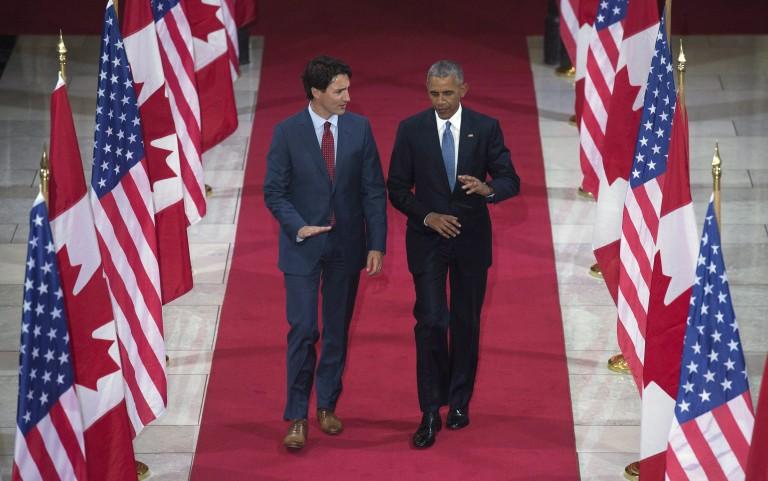Canada was a warmup. Obama’s hitting the campaign trail.
The U.S. President will appear at his first rally Tuesday with his would-be successor Hillary Clinton

Prime Minister Justin Trudeau speaks with United States President Barack Obama as they walk through the Hall of Honour on Parliament Hill in Ottawa, Wednesday June 29, 2016. THE CANADIAN PRESS/Adrian Wyld
Share
WASHINGTON – Canadians just glimpsed the test run of a man preparing to enter the 2016 U.S. presidential race.
Barack Obama is hitting the trail.
The president will appear at his first rally Tuesday with his would-be successor Hillary Clinton, just a few days after he showed an Ottawa audience some of the political payload he intends to unload on her rival.
MORE: Obama speaks to Ottawa, with the inveterate audacity of hope
It so happens that two of his most prolonged diatribes against Donald Trump in the pre-campaign phase came during joint news conferences where he was standing next to Prime Minister Justin Trudeau — last week’s was the latest.
During events in Parliament, Obama set up contrasts that match the message of Clinton’s campaign. Her latest TV ads highlight her lengthy record in public service, dating back to early advocacy for children and against segregated housing.
In what Obama himself later described as a rant, he said their mutual nemesis didn’t even merit being called a populist because he lacked any demonstrable history of actually caring about anyone but himself.
“Somebody who has never shown any regard for workers, has never fought on behalf of social-justice issues or making sure that poor kids are getting a decent shot at life or have healthcare … they don’t suddenly become a populist because they say something controversial in order to win votes,” Obama said.
“That’s not the measure of populism. That’s nativism or xenophobia or worse. Or it’s just cynicism.”
He then elaborated on the anti-xenophobia theme in a speech to Canada’s Parliament. Obama lauded Afghan-born cabinet minister Maryam Monsef; spoke of co-operation with Muslims; and referred to unnamed politicians who cynically exploit people’s frustrations with modernity and make impossible promises about returning to some lost economic past.
He didn’t refer specifically to the candidate running on the slogan of “Make America Great Again.”
He was more explicit the previous time he shared a podium with Trudeau. At the White House in March, a reporter asked about conservatives blaming him for the rise of Trump. Launching into a lengthy reply, Obama called that a bit rich, given how Trump initially became a conservative star: “I don’t think that I was the one to prompt questions about my birth certificate. I don’t remember saying, ‘Hey, why don’t you ask me about that?’ or ‘Why don’t you question whether I’m American, or whether I’m loyal?'”
Now, apparently, it’s payback time.
The president is significantly more popular than either of this year’s likely candidates. His favourable rating is just above 50 per cent — 17 per cent more than Trump, and 11 per cent more than Clinton.
He’ll start using some of that political advantage Tuesday. Obama-Clinton and Trump will hold competing rallies in North Carolina. It’s a state Obama won once, through he lost it in 2012 and still won a big majority in the electoral college.
“If Hillary Clinton can win the same states, then she’s the next president,” said Republican pollster Whit Ayres of North Star Opinion Research, who was the pollster for Sen. Marco Rubio’s presidential campaign.
He said the advantage of using Obama is that he remains wildly popular among Democrats. Obama inspired African-Americans to vote in record numbers, and won the younger demographic that spurned Clinton in the primary. He could also help with white voters — polling data from YouGov suggests nearly one-quarter of those who supported him haven’t yet backed Clinton.
But Ayres said there are drawbacks too.
He said Obama’s presence risks turning off Trump-skeptical Republicans and independents — the kind of persuadable voters who could support Clinton, but shudder at the idea of a third Obama term.
An expert on African-American voting patterns says, on balance, Obama is unquestionably an asset.
“There’s no downside in this for Hillary,” David Bositis said.
“The fact of the matter is Obama is more personally popular than any national politician right now. If you can attach yourself to someone who’s more popular that’s always a plus.”
He identified one small risk: the Trans-Pacific Partnership trade deal.
Obama is its highest-profile champion and the more visible he becomes, the greater the possibility it could cause a rift with the legions of young progressives who backed Sen. Bernie Sanders.
One analyst of swing states said he can be deployed in places — and in roles — where he’s obviously helpful.
“She will use him in critical swing states to rally hardcore Democrats and people of colour,” said David Schultz, a Hamline University professor and author of, “Presidential Swing States: Why Only Ten Matter.”
“He will be used for fundraising, criticizing Trump, and for trying to motivate the party base to vote for her. She is trying to channel his popularity to substitute for her lack of it.”